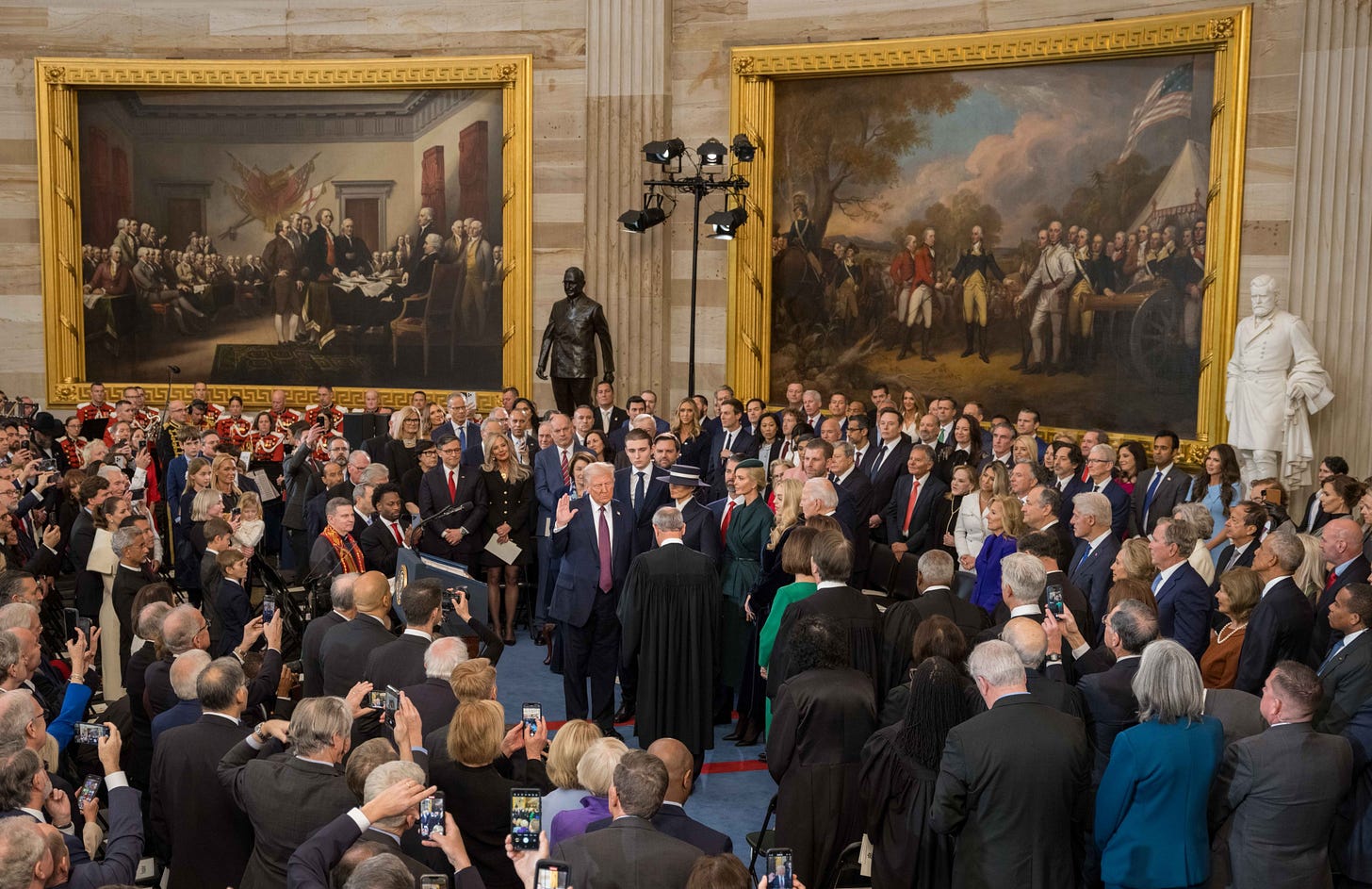Corporate Giants Hoping for Extension of Tax Cuts Funded Trump’s Inauguration
Trump raised a record amount for his inauguration—a sign that corporate America and wealthy individuals see value in making donations that put them in his good graces.

By Donald Shaw and David Moore, Sludge
Ten giant American companies that researchers recently identified as having the most at stake in the upcoming battle over the corporate tax code were all donors to Trump’s inauguration.
A recent report by Americans for Tax Fairness and Accountable.US examined 10 companies that account for a disproportionate share of corporate profits while paying a low effective tax rate by exploiting loopholes and subsidies from the 2017 tax law. The companies represented 46% of total profits among the top 136 U.S. firms on the 2023 Fortune 500, the report said.
The 10 companies have billions at stake in the current tax debate. According to a 2022 Congressional Budget Office (CBO) report, each percentage-point increase in the corporate tax rate raises roughly $130 billion for the government over 10 years. The Americans for Tax Fairness and Accountable.US report estimates that for the top 10 heaviest-taxed firms, a one-percent increase could cost them $21 billion over a decade. Alphabet could owe $5 billion more in taxes over a 10-year period if the corporate tax rate were raised from the current 21% to 26%, the authors of the report determined.
The companies, including Meta, Pfizer, Alphabet, and JPMorgan Chase, all donated to Trump’s inauguration. While Apple itself did not donate, its billionaire CEO Tim Cook reportedly made a personal donation of $1 million. Lobbyist contribution filings show that Meta and Comcast donated $1 million each to the Trump Vance Inaugural Committee, while news reports note that Microsoft, JPMorgan Chase, General Motors, and Alphabet also chipped in $1 million each. Rounding out the 10 companies, Pfizer, Citigroup, and Bank of America were also reportedly Trump inauguration donors, but the amounts they gave are currently unknown.
Trump raised a record amount for his inauguration, a sign that corporate America and wealthy individuals see value in making donations that put them in Trump’s good graces.
Along with cutting the corporate tax rate from 35 percent to 21 percent, the tax law grants tens of billions in tax breaks on profits that America’s richest multinational companies have kept overseas. The law shifted the U.S. to a territorial tax system that exempts most foreign-earned corporate profits from tax when repatriated, and it created a lower one-time repatriation tax system that benefited U.S. companies that had gathered significant profits in foreign accounts. Both moves are big victories for big business.
The 15 largest corporate beneficiaries of the 2017 tax cuts saved a combined $97.5 billion over four years, according to an October 2024 report by Accountable.US. Meta saved more than $8 billion and Comcast saved more than $6.6 billion, according to the report.
Several of the provisions of Trump’s 2017 tax law are set to expire this year, and renewing them was a top Trump campaign pledge. House Republicans took an initial step last month toward passing Trump’s plan by approving a budget resolution to send to the Senate.
Although Trump promised in 2017 that the tax cuts for the wealthy and large corporations “will be rocket fuel for our economy,” in practice the law sent stock buybacks and dividends soaring, and they’re projected to hit $1 trillion in 2025 — with very little of the savings going toward capital investment or increased wages.
According to the recent Americans for Tax Fairness and Accountable.US report, Bank of America enjoyed more tax subsidies during the first five years that the 2017 tax law was in effect than any other company — nearly $24 billion.
On the campaign trail, Trump touted a plan to further reduce the corporate tax rate to 15% for companies that make products in the United States. In order to generate revenue on paper for other parts of the tax law’s extension, though, some congressional Republicans have floated the idea of raising the corporate tax rate by a few percentage points. The Senate GOP caucus signaled it would nix the proposal.
The executives of the 10 companies are all members of the Business Roundtable, a trade association that lobbies the government for policies that favor large businesses. Last week, Trump spoke at the group’s quarterly meeting to an audience of its CEO members, noting that he had many friends in the audience. The Business Roundtable is lobbying Congress to retain the lower corporate tax rate from the 2017 law, preserve the law’s international tax rules, and expand incentives such as immediate research and development expensing.
In the final quarter of 2017, when the Tax Cuts and Jobs Act was being finalized, lobbying by the Business Roundtable skyrocketed to nearly $17.4 million — its largest quarterly lobbying spend ever, and more than four times that of previous three quarters.
Another enormous player in the coming lobbying spree that will be pushing for extension of the corporate tax provisions is the U.S. Chamber of Commerce, perennially one of the top spenders on lobbying in Washington. At least seven of the 10 giant companies from the report are members of the Chamber, according to their most recent political disclosures, and several are represented on the lobbying group’s board: Citi, Meta, and Microsoft.
Last year, Meta spent the most it ever had on lobbying in D.C., topping $24.4 million. As part of its record-setting spending in the first quarter, the company dispatched a handful of in-house lobbyists to lobby on corporate tax policy with the Treasury Department, Commerce Department, and the office of U.S. Trade Representative (USTR), according to its lobbying filing.
Among the row of Big Tech CEOs flanking Trump during his inauguration, Meta’s CEO Mark Zuckerberg distinguished himself in cozying up to the president by co-hosting a black-tie reception for Trump later that evening, alongside several billionaire Republican megadonors.
